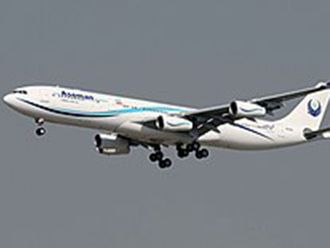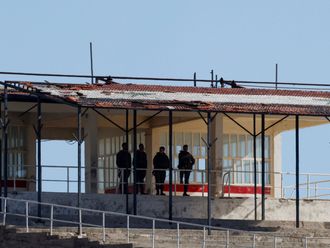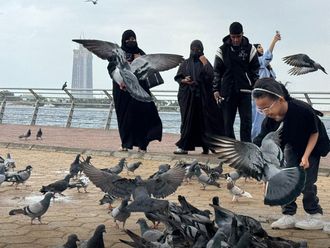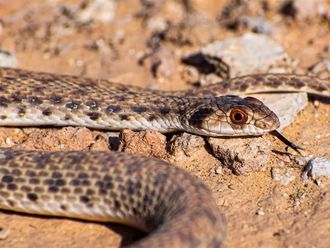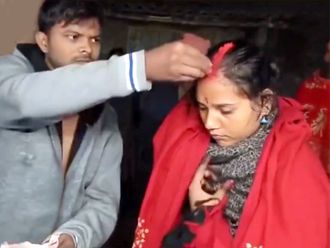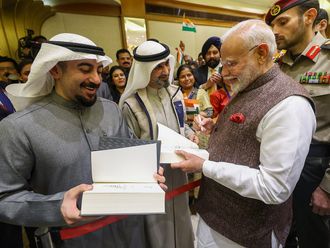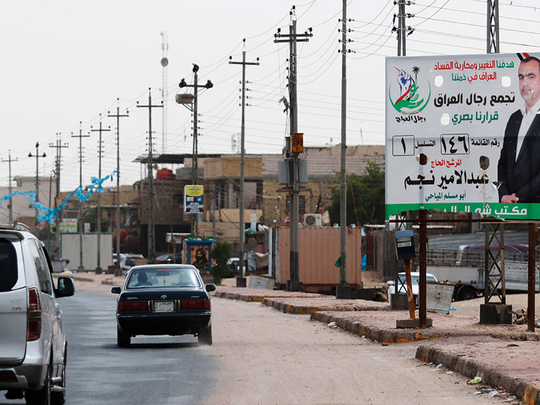
Basra: Not long ago they were battling against Daesh — now members of Iraqi paramilitary units have swapped the bullets for ballots as they compete in upcoming elections.
Abdul Ameer Najem was quick to sign up to fight when Iraq’s top Shiite cleric Ayatollah Ali Al Sistani issued a call to arms back in 2014 to stop the rampaging extremists.
The former security officer was one of tens of thousands who volunteered to join the Hashed Al Shaabi (Popular Mobilisation Units) that fought alongside Baghdad’s regular forces.
Five months after Iraq declared Daesh beaten, Najem is making a first foray into politics by standing for national parliamentary elections on May 12 in his southern home region Basra.
Running at the head of an alliance of local civil society figures and technocrats he says his experience in battle is perfect preparation for taking on Iraq’s corrupt elite.
“After the victory that we achieved at the front, we now have to battle those politicians who are just as bad as Daesh,” Najem tells AFP.
He vows to focus on education and hopes he can break through “the tribal allegiances, personal interests, promises, bogus projects and vote buying” that mar Iraqi politics.
The rise of the Hashed as a political force has shaken up the landscape ahead of the vote with some concerned their ties to Iran mean Tehran could gain more influence.
Members of the Shiite-dominated units feature widely on political lists vying for seats in the parliament.
Falih Khazali is running for the Conquest Alliance headed by Hashed leader Hadi Al Ameri, seen as one of the main challengers to incumbent Prime Minister Haider Al Abadi.
Khazali — an imposing figure who lost his right eye in battle — is no stranger to the minefield of Iraqi politics.
He was elected to parliament just before Daesh swept across his homeland in 2014 — but spent most of his mandate fighting on the front lines.
Together with his comrades, he says, he helped “win victory where even the 66 countries of the international coalition couldn’t fight”.
This experience is clearly a major selling point with potential voters.
“Someone who has sacrificed for Iraq will for sure make a good member of parliament,” says Tareq Jabbar, a 55-year-old civil servant as he listens to their pitches.
Labourer Mahmoud Yassin, 48, insists that people simply “want a change” as they are tired of the “same old faces” who have dominated Iraq since the fall of Saddam Hussain in 2003.
Not everyone appears entirely convinced.
Clutching an exercise book and calculator, student Ammar Mufid, 24, is not willing to pay any price for the reforms he wants to see.
“Some are using their combat against Daesh for political ends but what we really need are people who will fight against unemployment,” he says.
These concerns seem to have been taken on board by some of the ex-combatant candidates.
Khazali’s campaign headquarters are a hive of activity as dozens of youths busy away putting the finishing touches to his political programme.
He says he already has plans on “the economy, youth, poverty, housing, employment, agriculture and industry”, and has collated 50 dossiers of corruption cases he wants solved.
“Even during the past three-and-a-half years away at the front, I did not stop following politics,” he insists.
“Now we are relying on the conscience of the voters”.



